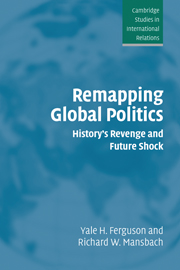Book contents
- Frontmatter
- Contents
- Preface
- Acknowledgments
- 1 Postinternational politics
- 2 Theory and method
- 3 Political space and time
- 4 States and other polities
- 5 Identities in a postinternational world
- 6 A postinternational world economy
- 7 War in a postinternational world
- 8 Technology and change
- 9 The future
- Index
- CAMBRIDGE STUDIES IN INTERNATIONAL RELATIONS
Preface
Published online by Cambridge University Press: 22 September 2009
- Frontmatter
- Contents
- Preface
- Acknowledgments
- 1 Postinternational politics
- 2 Theory and method
- 3 Political space and time
- 4 States and other polities
- 5 Identities in a postinternational world
- 6 A postinternational world economy
- 7 War in a postinternational world
- 8 Technology and change
- 9 The future
- Index
- CAMBRIDGE STUDIES IN INTERNATIONAL RELATIONS
Summary
The authors have been pursuing a joint research collaboration and agenda for over three decades. Our first joint book, The Web of World Politics (1976) sought to analyze what we perceived to be the growing significance and proliferation of nonstate actors in the global system. Our second, The Elusive Quest (1988) focused on the evolution and normative foundation of theory and method in the field of international relations. Next, The State, Conceptual Chaos, and the Future of International Relations Theory (1989) pointed up the diversity of interpretations of “the state” as a concept that masked different views of its character and significance. In Polities (1996) we turned to historical case studies of six pre-Westphalian systems and elaborated what we still believe is a timeless framework for understanding authorities, identities, and change. We put the Westphalian State in historical perspective, noted the contemporary erosion of state capacity, and suggested that the future would probably be more like the past of multiple authorities than the era when the European nation-state model was preeminent. The Elusive Quest Continues (2003) updated trends in theory and method in the preceding fifteen years.
Remapping Global Politics now compares and contrasts two political worlds, one international and the other postinternational. This book seeks to do exactly what the title promises – redraw our mental maps of global politics and explain the forces shaping change.
- Type
- Chapter
- Information
- Remapping Global PoliticsHistory's Revenge and Future Shock, pp. xi - xiiPublisher: Cambridge University PressPrint publication year: 2004

